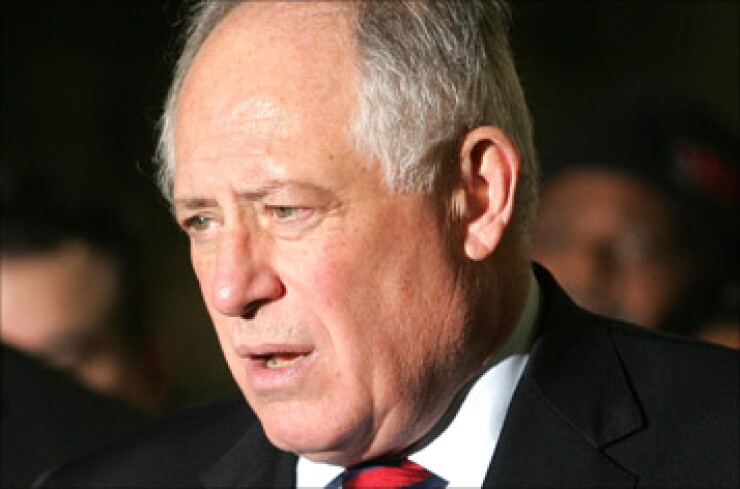
CHICAGO — Illinois Gov. Pat Quinn said Friday he's still "reviewing" legislation approved this spring that would overhaul two of the Chicago's struggling pension funds, as a Monday deadline looms for him to act.
Monday is the deadline for Quinn to sign, veto, or use his amendatory veto powers to alter Senate Bill 1922, which is designed to stabilize the city's municipal fund and laborers fund, both currently headed toward insolvency. If he does not act, the legislation takes effect automatically.
"I'm reviewing that bill," Quinn said at a public appearance Friday. "I'm gonna spend this weekend and into Monday. You know, we've looked at it quite a bit, but you've got to do your homework, right?"
Quinn has previously raised concerns about the city's plan to rely heavily on its property tax levy to fund a $750 million infusion of revenue to the funds. Chicago Mayor Rahm Emanuel dropped language in the bill that would have required at least half of the city's increased contributions to come from property taxes, but it's expected the city will still rely heavily on that levy.
The city is carrying $19.5 billion of unfunded obligations in its four pension funds — which also include a police fund and firemen's fund -- for a collective funded ratio of 35%, and the fiscal pressures have driven a steep credit deterioration.
The Civic Federation of Chicago, a local government research organization, weighed in on the issue with published pieces urging Quinn to sign the legislation and highlighting the state statutes that govern city pension benefits and cap contributions. It came in response to conflicting reports over whether the city could act on its own to improve funding ratios.
The city's payments have long fell short of an actuarially required contribution level designed to protect the health of retirement systems. The city's $480 million contribution to its four funds in 2013 fell $1.2 billion short of an actuarially based contribution level.
"This legislation represents a critical step by the city of Chicago to address its worst-in-the-nation pension funding crisis," federation president Laurence Msall said. The overhaul cuts some benefits, including cost-of-living increases, and also raises employee contributions.
"Chicago has the lowest credit rating of any major U.S. municipality outside of Detroit," Msall said, citing Moody's Investors Service's triple notch downgrade last year. The agency again lowered the rating earlier this year. "Chicago and other Illinois towns cannot afford further delays."
A chief concern for rating agencies and investors is the wide gap between the city's contribution levels and actuarially required contribution levels that would adequately fund the pension systems.
The federation, in a report, warned that Chicago area governments are prohibited from Improving pension funding without state intervention.
Eight local government pension funds in the Chicago area, including Chicago's four funds, are limited to payments based on a multiple of the total employee contribution made two years prior.
"The statute requires that the employer levy a property tax not to exceed the multiple amount," the federation wrote.
The pending legislation would allow Chicago to increase its contributions to two of its funds and set future payments after the five-year ramp up at an actuarially based level. The current statutory language in the municipal fund reads that the city's contributions are limited to "an amount not to exceed" 1.25 times what employees contributed to the fund two years prior.
"Illinois State statute is quite clear that the city of Chicago cannot currently and was not previously able to contribute more to its four pension funds than a specific multiple of what the employees contributed two years prior," the federation report read.
The report cites a court case, Houlihan v. City of Chicago, in which plan participants filed a class action suit seeking to recover interest funds they believed the funds were owed due to a delay in city contributions. The courts found that the city had no obligation to make the interest payments because the city had ultimately made its maximum allowable pension contribution based on the multiplier.
The statutes governing city funds were altered in the 1990s to allow the city to use non property tax revenues derived from any source legally available, including, but not limited to, the proceeds of city borrowings.
The point is significant for Chicago as it receives pushback from Quinn and city council members who are worried about the burden of funding higher contributions through property taxes. State lawmakers approved legislation that allows the city to raise its emergency services surcharge on telephone bills, which could raise about $50 million annually, freeing up general fund revenue now earmarked for the services.
Quinn on Friday signed the legislation that also extends the expiration date on the surcharge by one year until July 1, 2015.
Moody's rates Chicago's general obligation bonds Baa1 with a negative outlook. Fitch Ratings assigns its A-minus rating and a negative outlook and Standard & Poor's assigns its A-plus rating and negative outlook. Analysts have called the legislation awaiting Quinn's' action is a positive step forward that would restore solvency to the two funds, though any benefits through a notable impact on overall liabilities would be years away.
The city is already set to shift its payment to an ARC level on its police and fire funds under a prior state mandate aimed at moving local governments' public safety funds to a 90% funded ratio by 2040.
The city is facing a severe challenge next year in a $600 million spike in its contribution under that mandate. That legislation did not include benefit cuts or increases in employee contributions. The city is expected to push for a delay in the higher contributions and an overhaul of benefits in a coming legislative session.





